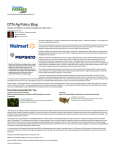Palatinose gains novel approval in Australia, NZ
in Australia and New Zealand, giving industry there the
opportunity to use the ingredient in popular low-glycaemic foods
and drinks.
Palatinit claims Palatinose, disaccharide Isomaltulose derived from pure beet sugar, is "the only low-glycaemic carbohydrate to supply energy in the form of glucose over a prolonged period of time".
The novel foods approval from Food Standards Australia New Zealand (FSANZ) opens up a whole new market for the German ingredients firm.
A spokesperson for Palatinit told FoodNavigator.com that Australia and New Zealand are the "perfect market", since low-glycaemic - that is carbohydrates that are released slowly, preventing peaks and troughs in blood sugar levels - is already a big trend there, and the concept is very well know.
The ingredient has already garnered interest from food and beverage manufacturers in Australia and New Zealand, but no indication could be given at the present time of the timescale for the first products to appear on the market.
The ingredient is also suitable for use in sports and wellness drinks, liquid meals and energy and cereal bars - categories that are well suited to the sporting and outdoorsy lifestyle in the two countries.
In addition, Palatinit says it can be used in dairy products - and New Zealand is one of the world's leading dairy producers.
The company has said that the ingredient is already approved in "many Asian countries" , so with this news a large piece of the regional puzzle falls into place.
It has the longest history of use in Japan, where isomaltulose has been used in foods and drinks since 1985 and has FOSHU status (foods for specified health uses).
But the spokesperson said that being around for a long time does not necessarily translate into thousands of tonnes sold, and indications from Japan are that the time is now ripe for use to mushroom.
Palatinose gained novel foods approval in the EU in July 2005, and in March 2006 the US FDA issued a letter to no objection to its GRAS status (generally recognised as safe).
While she said it was hard to give specific analysis for a market starter, the spokesperson said the company is "more than satisfied" about Palatinit sales to date, which have surpassed expectations.
Beyond the low-glycaemic aspect of Palatinose, the company says the powder has the same calorific value as sugar but is tooth-friendly.
"According to recent studies Palatinose appears to promote fat-burning, in contrast to high-glycaemic carbohydrates," it said.
References for these studies were not supplied.
Palatinit is not alone in targeting the Australian low-glycaemic market.
Late last year Horizon Science, a BioPacificVentures-backed company, said it has developed a 'totally natural low GI sugar' from parts of the sugar cane that are normally discarded during processing.
Horizon's product is expected to be released to the market in 2008.













